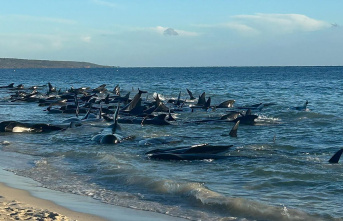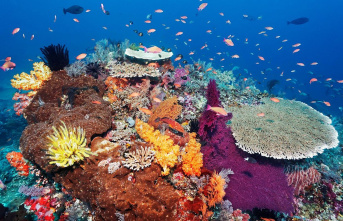The road to hell is paved with good intentions. Thinking of solutions is one thing; scramble to make them come true a different one. And we are more of the former than of the latter. Better let the others sweat. Of course, getting down to work may not save us a visit to hell. Sometimes, bad if you do and bad if you stop doing.
Decarbonization as a tool to combat climate change brings together all these contradictions. The apocalypse is in sight, the most vehement said long ago. Governments, companies and the majority of citizens inaugurate a long period of time talking about how we should live, but without lifting a finger to live in another way. They were years that fit like a glove in the belief that good intentions are nothing if they are not accompanied by action.
The academics, the millions of employees that the great climate change company has spread all over the world, the good people and even the Nordic girls, who are known to be the smartest and precocious, shouted until they were hoarse. This can not go on like this! More to do and less to enjoy! They won that battle and the time for action was inaugurated. Decarbonization at whatever price, zero emissions. We put on ourselves – particularly the Europeans – the yoke of green regulation to save the world. And there we are. Only now we discover that this is not as easy, beautiful and epic as we promised ourselves.
The Bank of Spain has just published chapter 4 of its annual report, “The Spanish economy in the face of the climate challenge”. The usual commitment to raising environmental anchor taxation is accompanied by a severe warning about the loss of competitiveness of companies, negative impacts on GDP and more inflation derived directly from the measures imposed by hammer to accelerate decarbonization.
In short, our determined and accelerated walk towards green is going to make us poorer. There is no hint of value judgment in the statement. It is simply the entry of what the Bank of Spain says in its report. Not only that. The entity warns that the great pagans of the party are going to be the most popular classes and with less disposable income. The fight against climate change is becoming classist. It is true that the report recommends public policies for the transfer of income to citizens with fewer resources, so that they can be compensated for the extra cost of transforming Spain into a green paradise. But at the moment we do rather the opposite. Subsidize the Tesla to those who could pay it in full, for example.
A few days ago we heard in Barcelona, at the Cercle d'Economia, the president of Repsol, Josu Jon Imaz, say with all the letters that the world will end 2022 with more CO2 emissions into the atmosphere. The blame? The acceleration of decarbonization with policies that have not measured their negative externalities well. The increase in the price of gas, for example, has caused countries with fewer resources to return to practices that have almost disappeared, such as burning oil to obtain energy. An increase that wants to be attributed solely to the Russo-Ukrainian war, but that the president of Enagás, Juan Antonio Llardén, attributed at the same debate table to the fact that the exporting countries have believed –we lie so well!– that in ten years we will stop buying gas from them. So in the meantime they have decided to cash in by raising the price now that we still need them. Wow, we've shot ourselves in the foot.
On the other hand, BlackRock, the largest fund manager in the world, has announced these days that it is putting the brakes on and stopping forcing its investee companies around the world to bet as intensely as until now on the abandonment of fossil fuels. It does not want to financially harm its investors. In 2020, its CEO, Larry Flink, became a financial apostle of emissions reduction. In just two years his position has changed. One thing is less emissions and another, less money in your pocket.
Bank of Spain, Cercle d'Economia, BlackRock. Three photos, of the many that appear daily, to understand that decarbonization is not the path of flowers that we promised ourselves. You have to pay each meter in cash. And the faster you want to travel, the bigger the bill. The positive? Perhaps the circumstances are giving for a reasonable debate between apocalyptic and integrated. Should Putin be thanked for bringing it about?
4












